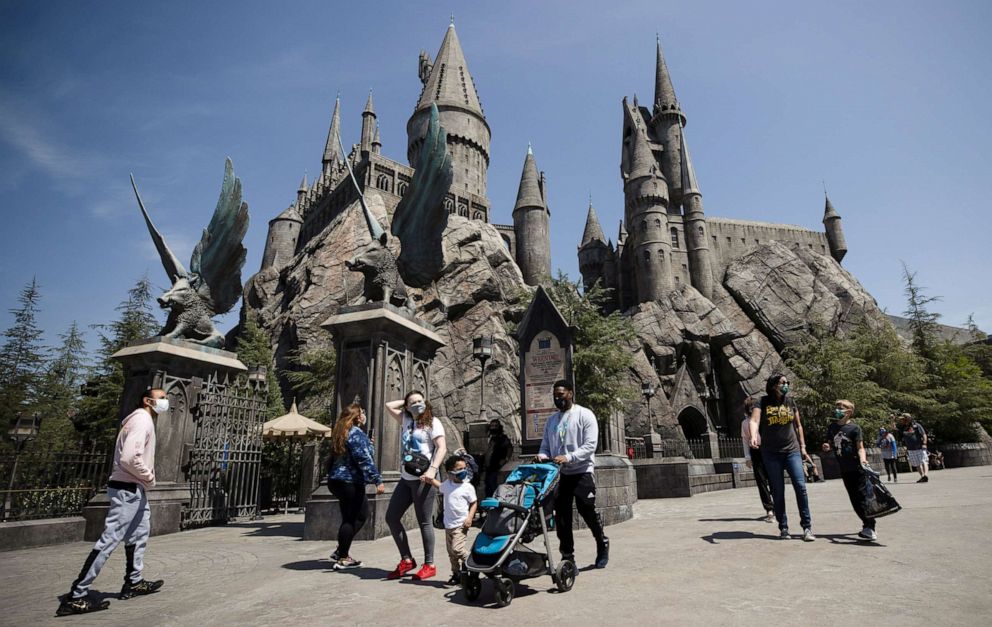'The worst is behind us': COVID virus ebbs, lending hope to a nation lashed by disease
The virus causing COVID-19 has begun to recede, just slightly, in the U.S.
As experts predicted, the pandemic is operating on less of a light switch than a dimmer -- dialing back and forth in different pockets of the country. For once though, it seems, the nation’s pandemic dimmer is turning in the right direction.
"I think we can confidently say the worst is behind us barring some crazy unforeseen variant that none of us are expecting to see," said Dr. Ashish K. Jha, dean of the Brown University School of Public Health.
"We will not see the kind of suffering and death we have seen over the holidays. I think we are in much better shape heading forward,” Jha told ABC’s "Good Morning America" Friday.
More than half the country - 26 states - has reported declining case numbers in the last week with new cases down 18 percent. Deaths and hospitalizations are down too. Even Michigan, the U.S. hotspot this spring, has seen its daily case average drop by more than 36 percent, according to data by the Centers for Disease Control and Prevention.
"We think this is related to increased vaccination, increased people taking caution, and so I'm cautiously optimistic that we're turning the corner," CDC Director Dr. Rochelle Walensky told GMA this week.

The Children’s Hospital of Philadelphia, which conducts its own weekly forecast, called it "clear evidence that transmission is falling" and predicted the trend would continue.
"Much of the improvements can be tied to increasing vaccination rates among younger and middle-age adults," the hospital’s PolicyLab concluded this week.
That cautious optimism comes with big caveats. Health experts predict the nearly 100 million Americans who are fully vaccinated isn’t nearly enough to crush the pandemic. While that represents some 30 percent of the population, it’s estimated some 70-85 percent of the country would have to be protected for “herd immunity” to take effect. Past infection of the virus might not count either because it’s unknown how long immunity lasts.
In Oregon, for example, officials warned cases were surging and hospitalizations doubled in the past two weeks, a trend driven by younger unvaccinated residents.
Also, as the U.S. situation improves, the global situation is still tenuous. India is deteriorating and its health system broken by a massive outbreak this spring. Other countries too have struggled to contain outbreaks, making it more likely that as the virus spreads unchecked, new variants will form.
"This can happen in a number of countries, in any countries if we let our guard down. I'm not saying that India has let its guard down but I'm saying we're in a fragile situation," said Dr. Maria Van Kerkhove, the World Health Organization’s technical lead for COVID-19, at a press conference this week.

So far, the vaccines offered in the U.S. are believed to provide protection against global variants. But the worst case scenario, health experts say, is that a new strain will develop overseas that is smarter at evading the body’s immune system, chipping away at the vaccine’s protection.
In other words, it’s possible that a lesser version of the pandemic will drag on for months in a kind of game of Whack-a-Mole. Communities with high vaccination rates would enjoy more freedom from the virus, whereas areas with more reluctance might contend with flareups. If global variants arrive, as is almost certain as travel resumes, the U.S. will scramble to deliver booster shots.
Still, even with all the warnings that the pandemic isn’t over, signs of life are returning. Louisiana convened its state fair Thursday, after canceling it last fall, and promised a second festival in fall. California’s Disneyland reopened Friday and water parks were planning to reopen this summer, after last year’s lost season.
Perhaps the biggest sign of life returning to the U.S. was the announcement that New York City would fully reopen July 1 with large Broadway productions expected this fall.
"This is going to be the summer of New York City," Mayor Bill de Blasio declared triumphantly this week. "I think people are going to flock to New York City because they want to live again."
Other local officials are ready to declare the pandemic over, even with some 50,000 cases averaging a day in the country.
"A widely available vaccine changes everything and it’s a new season in Tennessee," said Tennessee Gov. Bill Lee. "I am not renewing any public health orders because COVID-19 is no longer a health emergency in our state."
Walensky told reporters on Friday there is still a need to go slow.
“This virus has tricked us before so I would like to sort of watch and see how it goes before making further estimations of what happens in a couple of months," she said.
ABC News’ Matthew Vann, Arielle Mitropoulos and Cheyenne Haslett contributed to this report.




